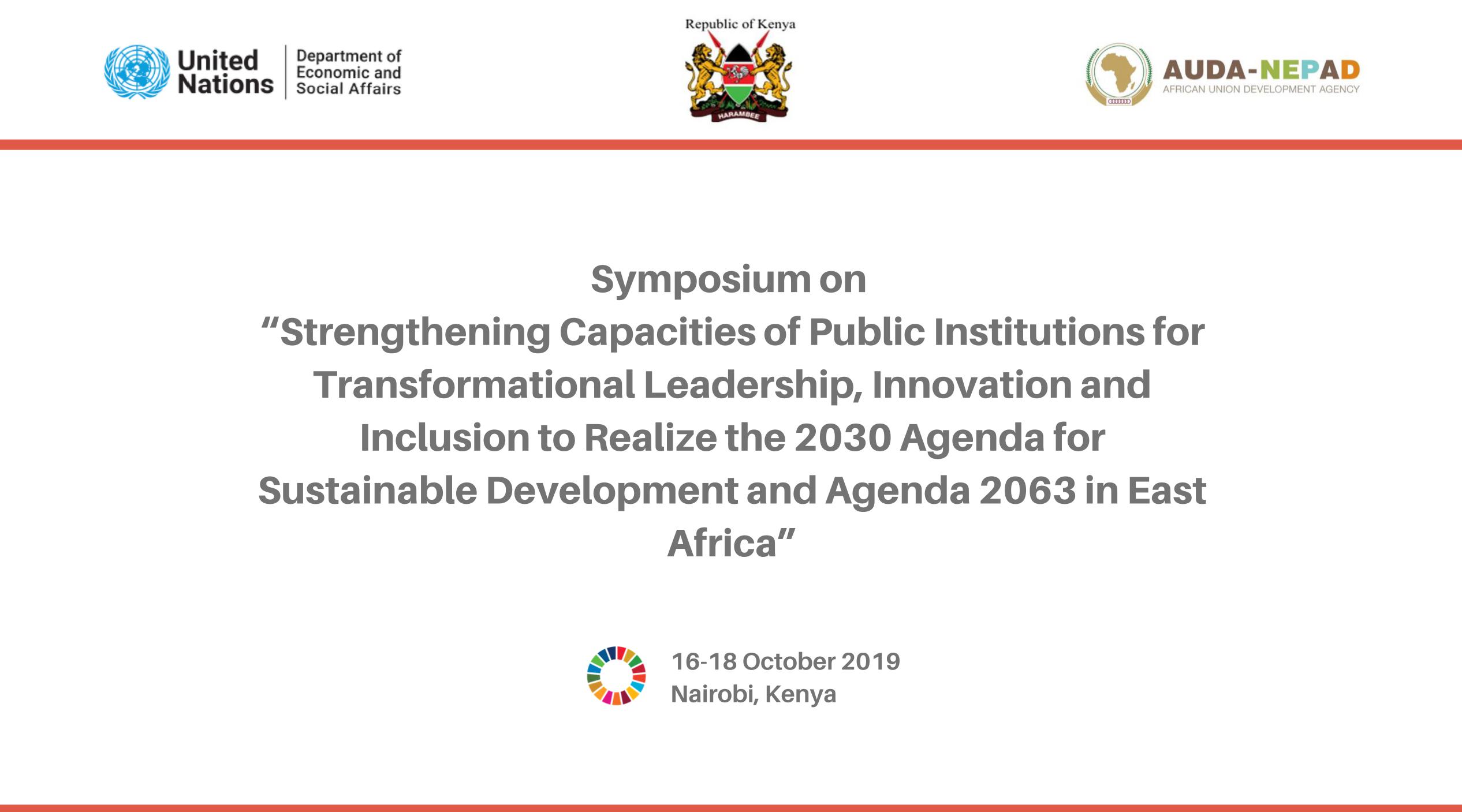Symposium on "Strengthening Capacities of Public Institutions for Transformational Leadership, Innovation and Inclusion to Realize the 2030 Agenda for Sustainable Development and Agenda 2063 in East Africa"

Key Messages
- Governance is an accelerator for SDG implementation and lack of public administration capacity has constituted a bottleneck in achieving SDGs for many African countries.
- Transformational leadership, which requires new mindsets and new competencies of public servants, is critical in achieving the 2030 Agenda and the Agenda 2063.
- The whole of government approach is important for enhancing national-local institutional effectiveness, localizing SDGs, and bolstering local actions.
- Emerging challenges in implementing the SDGs, such as climate change, require the continuous innovation in research and policy making, including through the continuous review of curricular for schools of public administration.
- Innovation is key to social inclusion of vulnerable groups – from innovating the public services to their specific needs and improving their access to public services to engaging and working with vulnerable groups.
INTRODUCTION
In 2015, the African Union (AU) adopted the Agenda 2063: The Africa We Want, as “both a Vision and an Action Plan…. a call for action to all segments of African society to work together to build a prosperous and united Africa based on shared values and a common destiny.” It is “a strategic framework for the socio-economic transformation of the continent” creating a roadmap for the continent’s pursuit for inclusive, transformative and sustainable development. In the same year, a united African voice joined world leaders at the United Nations Headquarters in New York and adopted the 2030 Agenda for Sustainable Development titled “Transforming Our World: The 2030 Agenda for Sustainable Development” and the Sustainable Development Goals (SDGs).
The 2030 Agenda for Sustainable Development recognizes the need to build peaceful, just and inclusive societies that provide equal access to justice and that are based on respect for human rights (including the right to development), on effective rule of law and good governance at all levels and on transparent, effective and accountable institutions” (A/RES/70/1, para. 35). Goal 16 of the 2030 Agenda specifically calls for effective, accountable and inclusive institutions at all levels.
An integrated and coordinated implementation of both strategic frameworks, Agenda 2063 and the global 2030 Agenda, offers Africa a unique opportunity to undergo a positive socio-economic transformation while preserving the environment. Sustainable development is at the heart of both strategic plans and in the 2030 Agenda it is defined as the pursuit of “five Ps”: People, Planet, Prosperity, Peace and Partnerships to effectively address the biggest two challenges of poverty eradication and climate change.
Good practices, lessons and challenges in East Africa are already emerging. These have been presented at the United Nations High-Level Political Forum on Sustainable Development (HLPF) where six East African countries presented their VNRs, such as Rwanda and Tanzania in 2019, Ethiopia and Kenya in 2017, Madagascar and Uganda in 2016. For instance, in its 2019 Voluntary National Review, Rwanda notes that “1. Visionary leadership, effective governance, and accountability are critical for the achievement of the SDGs, 2. Home-Grown Solutions rooted in the Rwandan culture are resource-efficient and play a major role in enhancing ownership and accelerating development outcomes. 3. A full integration of SDGs in the national planning and monitoring framework is critical for effective implementation.”[1] During the 2020 HLPF, East African countries such as Mozambique will be presenting their Voluntary National Reviews where SDG 1, SDG 2, SDG 3, SDG 5, SDG 9, SDG 14 and SDG 17 will all be reviewed for a second time since 2017.
Against this backdrop, UN DESA’s Division for Public Institutions and Digital Government, with support from its Project Office on Governance (UNPOG) and in collaboration with the Government of Kenya and the African Union Development Agency-NEPAD (AUDA-NEPAD), is organizing a Symposium to enhance public servants’ capacities in East Africa.
[1] Rwanda 2019 Voluntary National Review. Accessed at: https://sustainabledevelopment.un.org/content/documents/23069Rwanda_Main_Messages_VNR_Rwanda_Revised_with_word_limit.pdf


